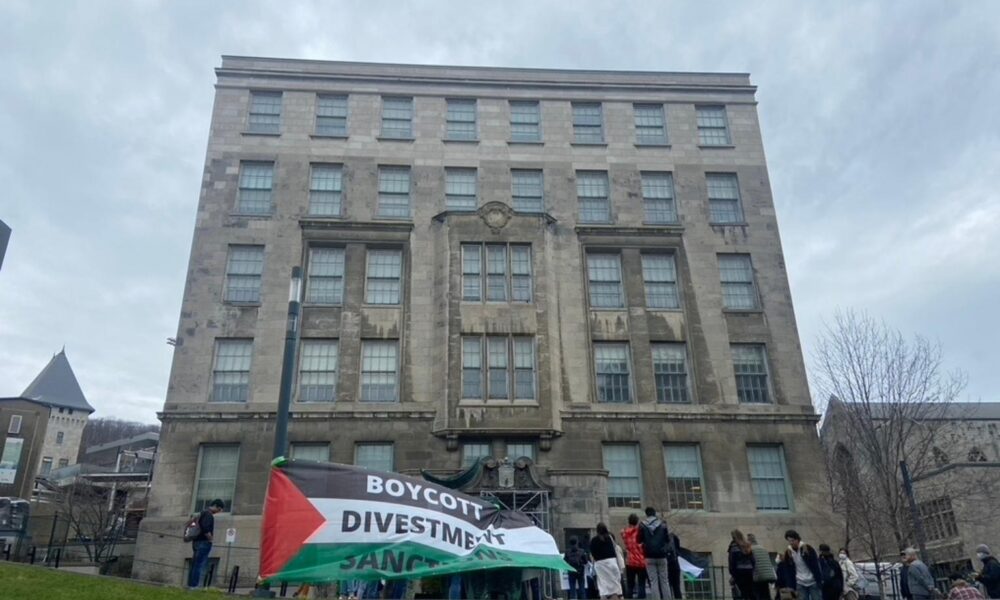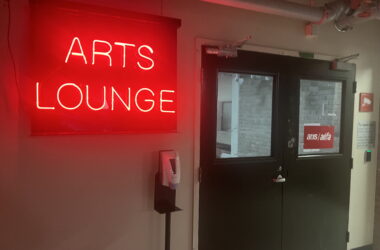The Students’ Society of McGill University (SSMU) announced in a statement on April 22 that they would not be adopting the Palestine Solidarity Policy, despite 71.1 per cent of voters endorsing it in the Winter 2022 referendum. The Policy would have mandated the Society to condemn the surveillance of Palestinian and pro-Palestine members of the McGill community, publicly assert its support for the cause of Palestinian liberation biannually, boycott companies complicit in the Israeli occupation of Palestine, and pressure the McGill administration to do the same.
The decision to drop the Policy came after sustained pressure from the McGill administration. On March 24, McGill’s Deputy Provost Fabrice Labeau sent an email to students that denounced the Policy as divisive and polarizing. Labeau explained that the administration found the Policy to be in violation of the university’s values and SSMU’s constitution. According to Labeau, if the policy was implemented, the university would end its Memorandum of Agreement (MoA) with the Society, which formalizes their relationship. The university gave SSMU 30 days to remedy the alleged violation of its constitution, or 90 days to submit the dispute for arbitration.
On April 22, when the SSMU concluded its internal investigation of the alleged MoA violation, the SSMU Board of Directors (BoD) announced that it had also found the Policy to be at odds with the SSMU Constitution, the SSMU Equity Policy, a 2016 SSMU Judicial Board ruling, and Quebec law. SSMU has therefore complied with the administration’s demand to revoke the Policy.
Students for Palestinian Human Rights (SPHR) McGill held a rally on April 25 in front of the James Administration Building to show support for the Policy and to protest SSMU’s decision. Before the rally, Noor,* a member of SPHR, voiced their dismay in an interview with The McGill Tribune.
“We do not recognize the SSMU Board of Directors’, or as we like to call them the board of dictators, decision to repeal or overturn this policy because it is a complete attack on student democracy and it completely dismisses the entire referendum vote,” Noor said. “We do not recognize it, and we urge students, as well, not to recognize the board of dictators’ decision [….] We are just really ashamed that the student union chose not to represent us.”
Noor believes that SSMU should have stood its ground when faced with pressure from the administration. They also think the Society timed its announcement to be released during the final exam period when students are preoccupied with studying—a sentiment shared by others who attended the rally.
“I think pressure from the admin definitely played a big role. I wouldn’t be surprised if [the] McGill administration was down [SSMU’s] throat,” Noor said. “[The SSMU BoD] could have easily said that it was constitutional, which it is, and went to arbitration, but they chose to overturn a democratically elected policy.”
Sarah Abdelshamy, a former member of SPHR and current organizer with the Palestinian Youth Movement, stated at the April 25 rally that she believes McGill’s intervention in the referendum was motivated by the interests of shareholders as opposed to the well-being of its students.
“They say that this motion is divisive without acknowledging that our campus has been divided for decades now—precisely because we do not have any motions or mechanisms that protect us,” Abdelshamy said. “For years now, students on campus have been harassed, doxxed, harmed, and targeted, and the administration turns a blind eye to it. The only division that this motion causes is between the university and its donors—the only relationship that the administration is capable of or desires to protect and uphold.”
In an email sent to the McGill community on April 26, Labeau applauded SSMU’s decision. While Labeau condemned the surveillance of pro-Palestinian students on campus and recognized the importance of student activism, he reasserted McGill’s stance against the adoption of the Policy.
In a speech at the SPHR rally, Islamic studies professor Rula Jurdi Abisaab criticized the administration for its rhetoric surrounding the Palestine Solidarity Policy.
“As an educator at McGill, I caution against the statements used by the administration, such as ‘a culture of ostracization and disrespect,’ to suppress the results of the democratic elections of McGill students,” Abisaab said. “Such phrases gravely misrepresent the aims of the Palestine Solidarity Policy and promote inadvertently a passive coexistence with injustice.”
Abisaab, also a signatory of the open letter from McGill faculty and staff endorsing the Palestine Solidarity Policy, further reaffirmed her admiration for the students championing the Policy.
“I support our students’ use of legitimate civil and democratic means to dissociate themselves from ideas and institutions that have promoted racism, dehumanization, and violence,” Abisaab said. “Our undergraduate students are to be praised for embracing democratic ideals of human dignity, freedom, and equality at McGill.”
Former SSMU President Darshan Daryanani, who was recently impeached, also spoke at the rally. He praised the Palestine Solidarity Policy for changing the discourse about Palestine on campus.
“I publicly defended and endorsed the Palestine Solidarity Policy. Personally, I agree with all the calls to action, and your 71 per cent overwhelming majority vote only made it easier to defend it,” Daryanani said. “Right now, more than ever, I urge you to continue to speak up because your voice matters.”
The Tribune reached out to the SSMU BoD for a statement on the decision-making processes that led to the nullification of the Palestinian Solidarity Policy. All executives declined to comment.
*Noor’s name has been changed to preserve their anonymity.









Pingback: Show up to the polls—and for your community - The McGill Tribune
Pingback: Charles Bronfman's $5 million donation to MISC raises concerns about academic freedom - The McGill Tribune